I was walking around, looking at the duck flock, when suddenly I noticed one duck, Kiwi, running off with something in her mouth – something big and slimy.
What was she eating?!
I followed her a short ways and determined that it was a frog. It was green and spotted, with long, slimy legs dangling from her bill. And it was larger than I thought she could eat. I watched her try to eat it for several minutes, and wondered whether frogs were good for ducks to eat or not, and finally decided not to let her have it. I had to pull the frog right out of her mouth. Yuck. She had half the frog down her throat and couldn’t get it any farther. I’m glad we wrested it away from her, because she likely would have choked on it, although later I looked it up later and found that frogs, at least some kinds, are fine for ducks to eat.
Ducks love eating odd things, and sometimes they don’t know what’s good for them. Muscovies are especially notorious for loving small animals of many kinds, even mammals. All ducks go wild for worms, crickets, cockroaches, and similar creepy-crawlies. Muscovies will sometimes even go for lizards and mice, and I’ve read about one Muscovy that devoured a whole nest of gopher babies! Since they’re waterfowl, they also love fish and other aquatic creatures.
And when a duck hits upon a treat like this, a chase starts. The lucky duck runs off with its prize as fast as it can, while the rest of the flock furiously scrambles after it in hopes of stealing the prize. Whether the catcher gets to eat its reward or not is anyone’s guess.

A container of superworms to feed our ducks.
Other times, they’ll find something that isn’t good for them. I once saw my ducklings chewing a piece of plastic tarp, and I was afraid they were ingesting pieces of it. I quickly removed their access to the shredded tarp. I’ve also read of other cases were chickens or ducks ate metal (because it’s shiny), plastic foam, and other dangerous substances.
It’s important to monitor your ducks’ yard and make sure there is nothing potentially harmful that they might try to eat. You should never trust your ducks to know what’s best.
- If a duck catches a lizard, cricket, or worm, no problem!
- If a duck is eating something you’re worried about or are unsure whether it’s good for them, you’re better off safe than sorry. Remove it.
- Be careful to remove any items in your duck pen that a duck may choke on or ingest. When you’re feeding your ducks and taking care of them, take a glance around and look for possible hazards.
Foods you should not feed your ducks
- Bread is low in nutrition and is very dangerous to feed in large quantities. It’s basically junk food.
- Cat food contains high quantities of methionine, which could possibly kill your ducks.
- Spinach prevents calcium absorption, which is especially dangerous for adult females. If you feed spinach, it should be in very small amounts only.
- Avocado is toxic to ducks (and many other animals).
- Chocolate is also toxic.
- Onions are toxic in large quantities.
- Dry or undercooked beans contain hemagglutinin and are toxic.
- Citrus is extremely acidic and will cause digestive problems in ducks.
- Raw green potato peels are toxic.
- Salty, sugary, or high fat foods are dangerous for ducks. The same goes for carbonated beverages, coffee, alcohol, or anything considered junk food for humans, like French fries or pepperoni.
Remember: just because they love it doesn’t mean it’s good for them. And just because you fed one of these foods to your birds before and they didn’t die does not mean it’s healthy for them.
Leave a comment
Your email address will not be published.